In today’s fast-paced world, maintaining an organized workspace is essential for productivity and mental clarity. One of the most effective tools to achieve this is a desk organizer. Whether you work from home, study, or manage a busy office, a desk organizer can revolutionize how you handle your daily tasks. This comprehensive guide explores the benefits, types, and tips for choosing the perfect desk organizer to enhance your workspace.
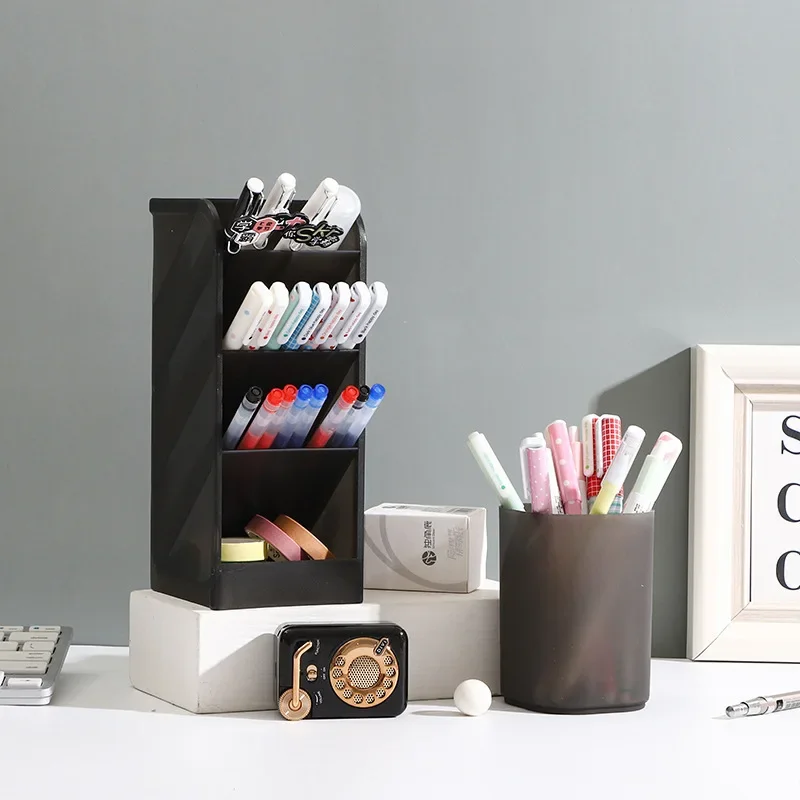 Why a Organizer is Essential for Your Workspace
Why a Organizer is Essential for Your Workspace
A cluttered desk can lead to unnecessary stress and decreased productivity. Investing in a desk organizer not only tidies up your workspace but also streamlines your workflow, making it easier to focus on what truly matters.
Boosts Productivity and Efficiency
An organized desk allows you to locate essential items quickly, reducing the time wasted searching for tools and documents.
- Streamlined Workflow: With everything in its place, you can move seamlessly between tasks without interruptions.
- Time Management: Prioritize your tasks effectively by keeping your to-do lists and essential items within easy reach.
- Enhanced Focus: A tidy environment minimizes distractions, helping you concentrate better on your work.
Reduces Stress and Enhances Mental Clarity
A clutter-free desk contributes to a calmer mind, fostering a positive and productive work environment.
- Visual Calmness: An organized space reduces visual clutter, which can overwhelm your senses and lead to stress.
- Mental Organization: Keeping your physical space organized helps in organizing your thoughts and ideas more clearly.
- Motivation Boost: A neat workspace inspires you to maintain cleanliness and order, reinforcing good habits.
Types of Organizers: Finding the Perfect Fit
There is a wide variety of desk organizers available, each designed to cater to different needs and preferences. Understanding the types of desk organizers can help you choose the one that best fits your workspace and lifestyle.
Desktop Organizers
Desktop organizers are designed to hold everyday items such as pens, paper, and sticky notes, keeping your most-used tools within easy reach.
- Tray Organizers: Feature multiple compartments for sorting pens, pencils, and small office supplies.
- Drawer Organizers: Fit into desk drawers, providing specific sections for various items to keep them neatly arranged.
- Pen Holders: Simple yet effective, these holders keep your writing instruments accessible and organized.
Multi-Functional Desk Organizers
These organizers offer a combination of storage solutions, catering to more comprehensive organizational needs.
- Tower Organizers: Stand tall on your desk, offering separate compartments for documents, gadgets, and stationery.
- Station Files: Incorporate file holders, pen storage, and space for other office essentials in one unit.
- Modular Systems: Allow you to customize your organizer by adding or removing components based on your specific requirements.
Specialized Desk Organizers
Specialized organizers are tailored to specific tasks or professions, providing unique storage solutions for specialized items.
- Tech Organizers: Designed to manage and store electronic accessories like chargers, cables, and headphones.
- Creative Organizers: Cater to artists and designers, offering compartments for brushes, sketchpads, and other creative tools.
- Executive Organizers: Offer a sophisticated look with compartments for business cards, high-end pens, and important documents.
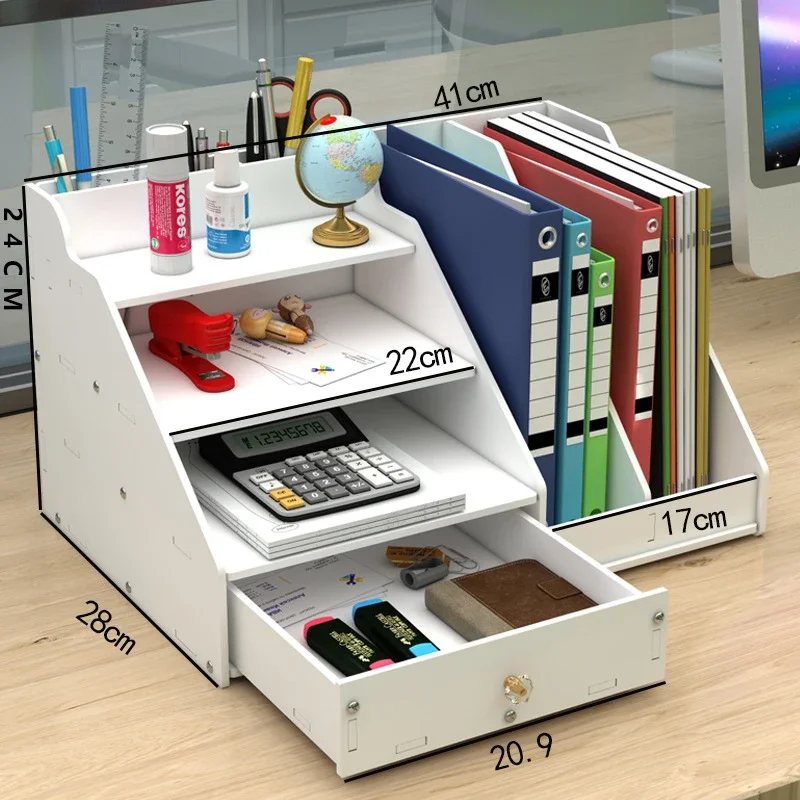 Choosing the Right Organizer for Your Needs
Choosing the Right Organizer for Your Needs
Selecting the ideal desk organizer involves considering several factors to ensure it meets your specific organizational needs and fits seamlessly into your workspace.
Assess Your Organizational Needs
Begin by identifying what items you need to store and how you use your workspace daily.
- Essential Items: Determine the items you use most frequently and ensure your organizer has dedicated spaces for them.
- Workflow Patterns: Consider how you move through your tasks and choose an organizer that complements your workflow.
- Space Availability: Measure your desk space to select an organizer that fits without overcrowding your workspace.
Material and Durability
The material of your desk organizer affects both its aesthetics and longevity. Choose materials that align with your style and offer durability.
- Wood: Provides a classic and elegant look, ideal for professional settings.
- Metal: Offers a modern and sleek appearance, known for its strength and longevity.
- Plastic: Lightweight and versatile, suitable for various styles and easy to clean.
- Eco-Friendly Materials: Consider organizers made from sustainable materials for an environmentally conscious choice.
Design and Aesthetics
Your desk organizer should complement the overall aesthetic of your workspace while providing functionality.
- Minimalist Designs: Opt for clean lines and simple structures that blend seamlessly with any decor.
- Color Coordination: Choose colors that match or complement your office furniture and accessories.
- Size and Shape: Ensure the organizer’s size and shape fit well on your desk and accommodate your items without taking up excessive space.
Functionality and Features
Evaluate the features and functionality offered by different desk organizers to find one that enhances your productivity.
- Multiple Compartments: Ensure the organizer has enough compartments to store various items without causing clutter.
- Accessibility: Choose an organizer that allows easy access to your items, preventing unnecessary rummaging.
- Portability: If you frequently travel or move your workspace, consider a portable organizer that is easy to transport.
Top Features to Look for in a Organizer
When selecting a desk organizer, certain features can significantly enhance its usefulness and impact on your productivity.
Adjustable Compartments
Flexibility in compartment sizes allows you to customize the organizer based on your changing needs.
- Expandable Sections: Look for organizers with expandable sections that can grow as your storage needs increase.
- Removable Dividers: Enable you to reconfigure the compartments to accommodate different items.
Built-In Charging Solutions
In an increasingly digital workspace, having a built-in charging station can keep your devices powered and eliminate cable clutter.
- Integrated Power Strips: Offer convenient access to power outlets for charging phones, tablets, and laptops.
- Cable Management: Keep your charging cables organized and prevent them from tangling.
Aesthetic Enhancements
Some desk organizers come with additional features that enhance the visual appeal of your workspace.
- Decorative Elements: Features like wooden finishes, metal accents, or patterned designs add a touch of style.
- Personalization Options: Customizable elements such as nameplates or interchangeable panels allow you to personalize your organizer.
Ergonomic Design
An ergonomic desk organizer promotes comfort and reduces strain during long work hours.
- Raised Sections: Help reduce neck and eye strain by keeping frequently used items at an optimal height.
- Smooth Edges: Prevent accidental bumps and provide a safer workspace.
Benefits of Using a Organizer
Implementing a desk organizer into your workspace offers numerous advantages that extend beyond mere tidiness.
Enhanced Productivity
With everything neatly arranged, you can focus more on your tasks and less on searching for items.
- Quick Access: Find what you need in seconds, allowing you to work more efficiently.
- Task Management: Use sections to organize your tasks and prioritize your workload effectively.
Improved Professional Appearance
A well-organized desk reflects professionalism and attention to detail, making a positive impression on clients and colleagues.
- Clean Presentation: Maintain a tidy workspace that showcases your organizational skills.
- Accessible Documents: Keep important documents and reports easily accessible for meetings and presentations.
Better Time Management
Save valuable time by reducing the chaos and interruptions caused by a cluttered desk.
- Structured Workspace: Allocate specific areas for different tasks, making it easier to switch between them.
- Reduced Distractions: Eliminate the visual noise that can distract you from your work.
Promotes a Positive Work Environment
A clutter-free desk contributes to a more pleasant and inviting workspace, enhancing your overall work experience.
- Mental Well-Being: An organized space can reduce stress and improve your mood.
- Creative Boost: A tidy workspace fosters a creative mindset, allowing you to think more clearly and innovatively.
Creative Uses for Organizers
Beyond their primary function, desk organizers can be adapted for various creative and practical uses to maximize their utility.
Personalized Stationery Station
Transform your desk organizer into a personalized stationery station to keep all your writing tools in one place.
- Pen and Pencil Holders: Use different sections for pens, pencils, markers, and highlighters.
- Sticky Note Racks: Incorporate racks or holders for sticky notes to keep your reminders handy.
- Clip Organizers: Allocate space for paper clips, binder clips, and other small office supplies.
Tech Hub
Create a dedicated tech hub with your desk organizer to manage your electronic devices and accessories efficiently.
- Device Stands: Use sections to hold your smartphone, tablet, and smartwatch at eye level.
- Cable Management: Organize your charging cables and earphones to prevent tangling.
- Accessory Storage: Keep your gadgets and accessories neatly arranged for easy access.
Creative Inspiration Board
Convert your desk organizer into a creative inspiration board to keep your ideas and inspirations within reach.
- Pinboards and Clipboards: Use these to display inspirational quotes, photos, or sketches.
- Open Compartments: Store your creative tools like pens, markers, and sketchpads for quick brainstorming sessions.
- Idea Storage: Allocate sections for jotting down ideas and keeping them organized.
Minimalist Workspace Solution
For those who prefer a minimalist approach, use your desk organizer to maintain a clutter-free and efficient workspace.
- Essential Items Only: Store only the items you use daily, keeping your desk space clear.
- Streamlined Design: Choose a sleek and simple organizer that blends seamlessly with your minimalist decor.
- Efficient Layout: Arrange your essentials in an orderly manner, reducing visual clutter and enhancing focus.
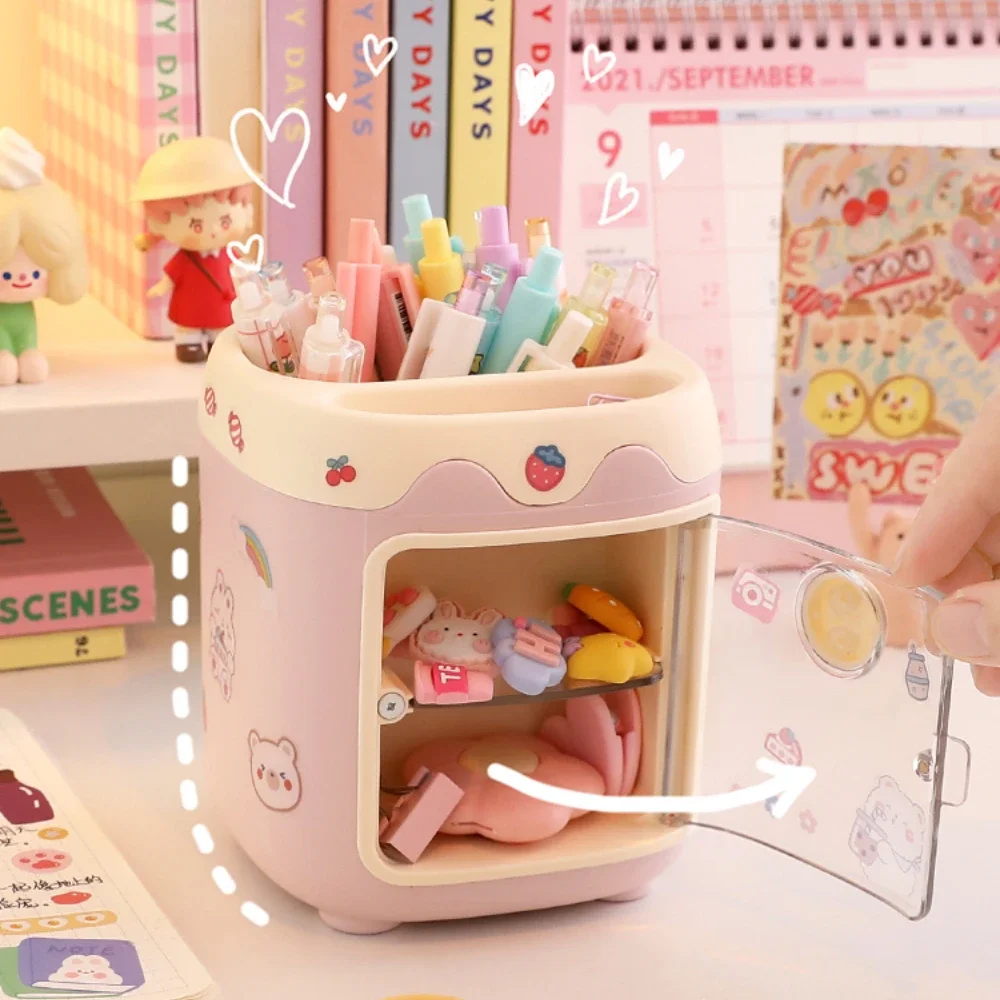 Top Organizer Brands and Products
Top Organizer Brands and Products
Several brands specialize in creating high-quality desk organizers that cater to various needs and preferences. Here are some top recommendations to consider.
Simple Houseware Mesh Desk Organizer
This affordable and functional organizer is perfect for keeping your essentials neatly arranged.
- Mesh Design: Allows for easy visibility and access to your items.
- Multiple Compartments: Features various sections for storing pens, phones, and other office supplies.
- Easy Maintenance: The mesh material is easy to clean and maintain.
mDesign Modern Plastic Desk Accessory Organizer
A versatile and stylish option that adds a touch of modern elegance to your workspace.
- Sleek Design: Minimalist design fits well in any contemporary office setting.
- Durable Construction: Made from high-quality plastic, ensuring longevity.
- Organized Storage: Multiple compartments keep your items organized and accessible.
Rolodex Mesh Collection Tray
Ideal for those who prefer a classic and professional look, this organizer offers ample storage space.
- Professional Appearance: Classic mesh design adds sophistication to your desk.
- Spacious Compartments: Large sections accommodate various office supplies and documents.
- Flexible Organization: Easily customize the tray to suit your storage needs.
YAMAZAKI home Tower Desk Organizer
A premium option known for its durability and elegant design, perfect for executive offices.
- Sturdy Build: Made from robust materials that withstand daily use.
- Elegant Design: Features a sleek and sophisticated look that enhances any workspace.
- Comprehensive Storage: Offers multiple sections for organizing documents, gadgets, and stationery.
DIY Organizer Ideas
If you enjoy crafting and want a personalized touch, creating your own desk organizer can be a fun and rewarding project.
Repurposed Containers
Turn everyday household items into functional desk organizers for a unique and eco-friendly solution.
- Mason Jars: Use mason jars to store pens, pencils, and other small items.
- Tin Cans: Decorate tin cans with paint or fabric to hold office supplies.
- Wooden Crates: Stack wooden crates to create a multi-level organizer with ample storage space.
Customized Wooden Organizers
For a more tailored approach, build your own wooden desk organizer to match your specific needs and aesthetics.
- Measure and Plan: Determine the size and layout based on your desk space and storage requirements.
- Choose Your Wood: Select a type of wood that complements your workspace and offers durability.
- Assemble and Finish: Construct the organizer with compartments and drawers, then finish with paint or stain for a polished look.
Creative Paper and Cardboard Organizers
Use paper or cardboard to design lightweight and customizable desk organizers that are easy to assemble and modify.
- Origami Techniques: Create intricate designs and structures using origami methods for a decorative touch.
- Cardboard Boxes: Cut and glue cardboard boxes to form compartments and storage sections.
- Decorative Paper: Enhance the appearance of your organizer with decorative paper, stickers, and embellishments.
Maintaining an Organized Desk with a Organizer
Keeping your desk organizer in top condition ensures it continues to serve its purpose effectively.
Regular Cleaning and Maintenance
Regularly clean your desk organizer to maintain its appearance and functionality.
- Dusting: Use a damp cloth to remove dust and debris from your organizer.
- Sanitizing: Wipe down with a mild cleaner to disinfect surfaces, especially if you frequently handle items like pens and phones.
- Preventing Clutter: Periodically review and declutter your organizer to keep only essential items.
Reassessing Your Organizational Needs
As your work habits and needs evolve, reassess and adjust your desk organizer accordingly.
- Reorganize Compartments: Shift items to different sections based on their usage frequency.
- Add or Remove Components: Modify your organizer by adding new compartments or removing unnecessary ones to better suit your current needs.
- Upgrade When Necessary: Invest in a new organizer if your current one no longer meets your organizational requirements.
Promoting Consistent Use
Maintain an organized desk by making the use of your desk organizer a consistent habit.
- Daily Tidying: Spend a few minutes each day tidying up your desk and organizing items back into your organizer.
- Designated Spaces: Assign specific areas within your organizer for different items, ensuring everything has a place.
- Routine Checks: Regularly check your organizer to ensure it remains clutter-free and functional.
Enhancing Your Workspace with Additional Organizational Tools
In addition to a desk organizer, incorporating other organizational tools can further enhance your workspace efficiency.
Cable Management Solutions
Keep your workspace free from tangled and messy cables with effective cable management solutions.
- Cable Clips: Use clips to secure and organize cables along the edge of your desk.
- Cable Ties: Bundle multiple cables together to reduce clutter and prevent tangling.
- Cable Management Boxes: Hide excess cables in boxes to maintain a clean and streamlined appearance.
File Management Systems
Proper file management is crucial for maintaining an organized workspace, especially if you handle a lot of paperwork.
- Filing Cabinets: Use filing cabinets to store important documents and keep them easily accessible.
- File Holders: Place file holders on your desk to organize current projects and paperwork.
- Digital Filing: Consider digitizing documents to reduce physical clutter and improve accessibility.
Ergonomic Accessories
Enhancing the ergonomics of your workspace can improve comfort and productivity.
- Monitor Stands: Elevate your monitor to eye level to reduce neck strain and improve posture.
- Keyboard Trays: Use keyboard trays to position your keyboard at a comfortable height, preventing wrist strain.
- Chair Accessories: Invest in ergonomic chairs and accessories such as lumbar supports to maintain proper posture during long work hours.
Innovative Organizer Designs to Inspire You
Innovation in desk organizer designs has led to creative and multifunctional solutions that cater to diverse needs and preferences.
Minimalist Desk Organizers
Perfect for those who prefer a clean and simple workspace, minimalist organizers offer essential storage without unnecessary clutter.
- Slim Profiles: Designed to take up minimal desk space while providing sufficient storage for essentials.
- Simple Compartments: Feature basic compartments for items like pens, notepads, and phones.
- Neutral Colors: Often available in neutral colors that blend seamlessly with any desk decor.
Tech-Integrated Organizers
Stay connected and organized with desk organizers that incorporate technology for enhanced functionality.
- Built-In Chargers: Provide charging ports for your devices, keeping them powered and ready.
- LED Lighting: Feature LED lights to illuminate your workspace and improve visibility.
- Smart Storage: Include compartments specifically designed for gadgets, such as tablets, smartphones, and smartwatches.
Artistic and Decorative Organizers
Add a touch of creativity and personality to your workspace with artistic and decorative desk organizers.
- Handcrafted Designs: Feature unique, handcrafted elements that reflect your personal style.
- Colorful Patterns: Incorporate vibrant colors and patterns to brighten up your desk area.
- Functional Art: Combine aesthetics with functionality, creating organizers that serve as both storage solutions and decorative pieces.
Space-Saving and Compact Organizers
Ideal for small workspaces, space-saving organizers maximize storage without occupying much desk space.
- Stackable Units: Offer stackable compartments that utilize vertical space effectively.
- Foldable Designs: Feature foldable or collapsible elements that can be easily stored when not in use.
- Multi-Purpose Compartments: Provide versatile storage options that can be used for various items, reducing the need for multiple organizers.
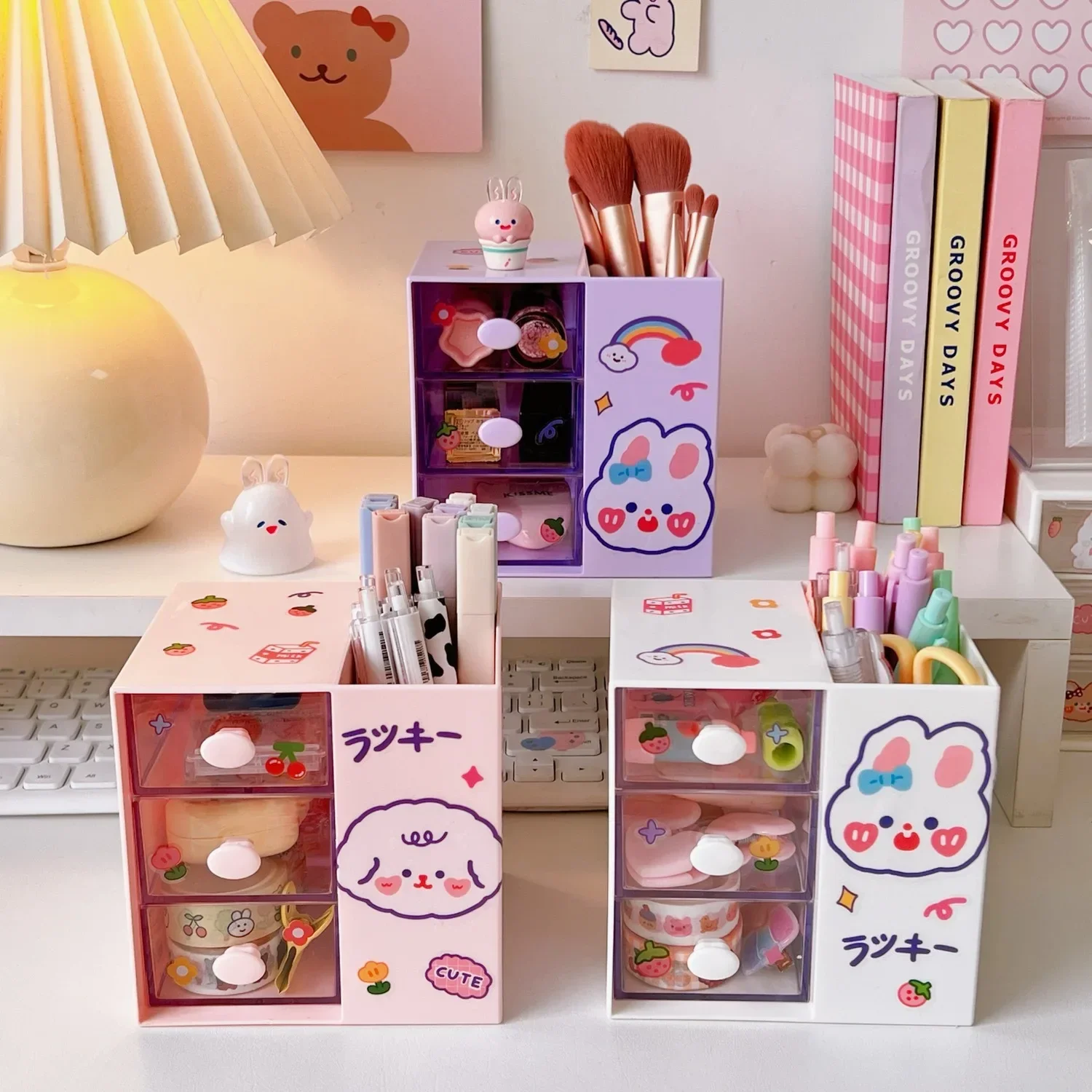 Customizing Your Organizer for Maximum Efficiency
Customizing Your Organizer for Maximum Efficiency
Tailor your desk organizer to meet your specific needs and enhance its efficiency through customization.
Personalized Layouts
Create a layout that aligns with your workflow and organizational preferences.
- Dedicated Sections: Assign specific sections for different categories of items, such as office supplies, gadgets, and personal items.
- Adjustable Compartments: Modify compartment sizes to accommodate items of varying sizes and shapes.
- Labeling: Use labels to clearly identify the contents of each section, making it easier to find items quickly.
Incorporating Personal Touches
Add personal elements to make your desk organizer uniquely yours and more enjoyable to use.
- Photos and Mementos: Include small photos or mementos to personalize your workspace and make it more inviting.
- Decorative Accents: Use decorative accents such as ribbons, stickers, or washi tape to enhance the visual appeal of your organizer.
- Custom Tags: Add custom tags or labels with your name or initials for a personalized touch.
Optimizing for Specific Tasks
Customize your organizer based on the types of tasks you perform regularly.
- Creative Professionals: Allocate space for art supplies, sketchbooks, and creative tools.
- Office Workers: Include sections for important documents, pens, and office stationery.
- Students: Organize textbooks, notebooks, and study materials efficiently to support your academic endeavors.
Sustainable Organizers: Eco-Friendly Choices
Embrace sustainability by choosing desk organizers made from eco-friendly materials and ethical manufacturing practices.
Sustainable Materials
Opt for desk organizers crafted from environmentally friendly materials to reduce your ecological footprint.
- Recycled Materials: Select organizers made from recycled plastics or metals to promote recycling and waste reduction.
- Natural Fibers: Choose organizers made from natural fibers such as bamboo, cork, or reclaimed wood for a sustainable option.
- Biodegradable Components: Look for organizers that incorporate biodegradable materials, minimizing environmental impact.
Ethical Manufacturing
Support brands that prioritize ethical manufacturing practices to ensure fair labor conditions and sustainable production.
- Fair Trade Certified: Choose organizers from brands that are fair trade certified, ensuring ethical treatment of workers.
- Local Production: Support local manufacturers to reduce carbon emissions associated with transportation and support local economies.
- Transparent Supply Chains: Favor brands that disclose their production processes and material sourcing, promoting transparency and accountability.
Durable and Long-Lasting Designs
Invest in high-quality desk organizers that are built to last, reducing the need for frequent replacements and minimizing waste.
- Sturdy Construction: Select organizers made from durable materials that can withstand daily use without wear and tear.
- Timeless Designs: Choose classic and timeless designs that remain stylish and functional over the years, avoiding the trend-driven disposability of cheaper products.
- Repairable Features: Opt for organizers that can be easily repaired or updated, extending their lifespan and maintaining their functionality.
Maximizing the Benefits of a Desk Organizer
To fully reap the benefits of a desk organizer, implement strategies that integrate it seamlessly into your daily routine.
Developing Organizational Habits
Adopt habits that maintain the order and functionality of your desk organizer.
- Daily Cleaning: Spend a few minutes each day tidying up your desk and organizing items back into your desk organizer.
- Weekly Reviews: Conduct weekly reviews of your organizer to declutter and reorganize as necessary, ensuring it stays functional and efficient.
- Consistent Storage: Always return items to their designated places within the organizer to prevent clutter from building up.
Integrating with Other Organizational Tools
Combine your desk organizer with other tools to create a cohesive and efficient workspace.
- Planners and Calendars: Use planners and calendars alongside your desk organizer to manage your tasks and appointments effectively.
- Digital Tools: Integrate digital tools such as task management apps with your physical organizer to streamline your workflow.
- Storage Bins: Utilize additional storage bins or boxes to complement your organizer, providing extra space for larger items or bulk storage.
Adapting to Changing Needs
As your work or study habits evolve, adapt your desk organizer to meet your new requirements.
- Rearrange Compartments: Modify the layout of your organizer to accommodate different items or changing priorities.
- Add Accessories: Incorporate additional accessories such as trays, hooks, or holders to expand the functionality of your organizer.
- Upgrade When Needed: Replace or upgrade your desk organizer if it no longer meets your needs, ensuring your workspace remains optimized for productivity.
Real-Life Examples of Desk Organizer Benefits
Understanding how a desk organizer can transform a workspace can inspire you to make the investment. Here are some real-life examples showcasing the benefits of using a desk organizer.
Enhanced Productivity for Remote Workers
Remote workers often juggle multiple tasks and tools, making an organized workspace crucial for maintaining productivity.
- Quick Access to Tools: With a desk organizer, remote workers keep their office supplies, documents, and gadgets within easy reach, reducing downtime spent searching for items.
- Efficient Task Management: Organizing tasks and priorities within the planner section of the organizer helps remote workers stay on track and meet deadlines effectively.
Improved Focus for Students
Students benefit greatly from an organized desk, which helps them concentrate on their studies without being distracted by clutter.
- Organized Study Materials: A desk organizer keeps textbooks, notebooks, and writing tools neatly arranged, making it easier for students to find and access their materials when needed.
- Dedicated Study Zones: By creating designated areas for different subjects or types of work, students can maintain focus and manage their study time more efficiently.
Professional Appeal in Office Settings
In professional office environments, a clean and organized desk can enhance your professional image and efficiency.
- Client Impressions: A well-organized desk presents a professional image to clients and colleagues, showcasing your attention to detail and organizational skills.
- Streamlined Workflow: Keeping essential documents and office supplies arranged in a desk organizer allows for a more efficient workflow, reducing the time spent on administrative tasks.
Creative Inspiration for Artists and Designers
Creative professionals can harness the potential of desk organizers to keep their tools and inspirations within reach.
- Tool Accessibility: Artists and designers can store their tools, such as pens, brushes, and sketchbooks, in an organized manner, allowing for easy access during creative sessions.
- Inspiration Preservation: Incorporating sections for inspirational items like photos, samples, or mood boards helps maintain a creative and inspiring workspace.
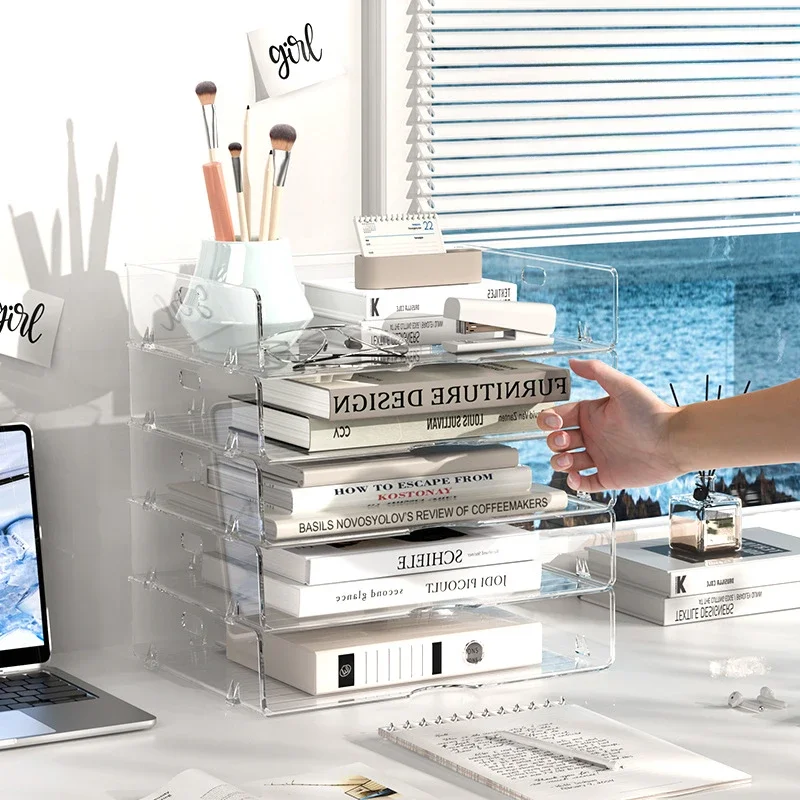 Frequently Asked Questions About Desk Organizers
Frequently Asked Questions About Desk Organizers
Addressing common queries about desk organizers can help you make an informed decision when choosing the right one for your needs.
What Are the Best Materials for Desk Organizers?
The best materials for desk organizers depend on your preferences and the desired aesthetic for your workspace.
- Wood: Offers a classic and elegant look, perfect for professional settings.
- Metal: Provides a modern and sleek appearance, known for durability.
- Plastic: Lightweight and versatile, suitable for various styles and easy to clean.
- Eco-Friendly Materials: Choose materials like bamboo or recycled plastics for sustainable options.
How Can I Keep My Desk Organizer Clutter-Free?
Maintaining a clutter-free desk organizer involves regular organization and mindful habits.
- Daily Tidying: Spend a few minutes each day putting items back in their designated places.
- Declutter Regularly: Periodically review your organizer and remove items you no longer need or use.
- Use Specific Compartments: Assign specific sections for different items to prevent mixing and clutter.
Are There Desk Organizers for Small Workspaces?
Yes, there are desk organizers specifically designed for small workspaces, offering compact and efficient storage solutions.
- Vertical Organizers: Utilize vertical space to maximize storage without taking up much desk area.
- Modular Systems: Allow you to customize your organizer to fit your specific space constraints.
- Multi-Functional Organizers: Combine multiple storage functions into a single compact unit, saving space while providing ample storage.
Can Desk Organizers Improve My Mental Health?
An organized workspace can positively impact your mental health by reducing stress and enhancing focus.
- Reduced Stress: A tidy desk minimizes visual clutter, which can help lower stress levels and create a calmer work environment.
- Increased Focus: An organized space allows you to concentrate better on your tasks, improving overall productivity and mental clarity.
- Sense of Accomplishment: Maintaining an organized workspace fosters a sense of control and accomplishment, contributing to better mental well-being.
How Do I Choose Between Different Types of Desk Organizers?
Choosing the right desk organizer depends on your specific needs, preferences, and the nature of your work.
- Assess Your Needs: Identify the items you use most frequently and determine the necessary compartments and storage solutions.
- Consider Space: Measure your desk space to ensure the organizer fits without overcrowding.
- Evaluate Style: Choose a design that complements your workspace aesthetics and personal style.
- Prioritize Functionality: Select an organizer that offers the features and functionality that best support your workflow and organizational habits.
Conclusion
In conclusion, a desk organizer is an invaluable tool for anyone looking to enhance their workspace’s functionality and aesthetics. By investing in the right organizer, you can boost your productivity, reduce stress, and create a more organized and efficient work environment. Whether you prefer a minimalist design, a tech-integrated solution, or a creative and artistic approach, there is a desk organizer that perfectly fits your needs. Embrace the benefits of an organized desk and transform your workspace into a haven of productivity and creativity.